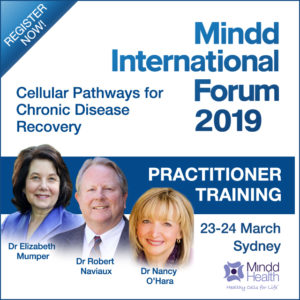Meet Your Mitochondria: the body’s energy powerhouses
Do you remember when ‘Gut Health‘ and ‘Microbiome‘ arrived as important, trending healthcare topics? (They still are). Well now, the new term worth getting to know is ‘Mitochondria‘. If healthcare were in the fashion industry, mitochondria would be the new black! But seriously, our mitochondria affects every one of our body functions – and there is a lot that can be done to impact overall health and support disease recovery.
Mitochondria is an important theme for the Mindd Forum 2019. Insightful presentations explore this key topic in both the Integrative Healthcare Public Stream, and masterclasses in the Practitioner Training. This article introduces the importance of how the mitochondria impacts all aspects of health.
Mitochondria are essential to energy, vitality, metabolism, and focus. These “energy factories”, if helped through nutrition and lifestyle can support the body to perform at its peak. Mitochondria turn the food we eat and the oxygen we breathe into energy.
What are Mitochondria?
Mitochondria are found inside every cell in the body. They are the parts of the cell (called organelles) that generate energy, converting oxygen and nutrients into energy for every single cell in the body, except for the red blood cells. That means every organ-cell and every system-cell has these powerhouses pumping out energy so they can help keep their organ, or the system it is part of, working properly. Now imagine that some of the Mitochondria in a certain organ begin to malfunction. Immediately that organ, be it the kidneys, liver, heart or muscle, would cease working efficiently. Gradually the organ itself and the system it was part of would be in trouble.
What do Mitochondria do?
Mitochondria are not only involved with energy production. In fact, more than 90% of their function is to do with metabolic management in the body. Your metabolism is what keeps you balanced; makes sure that tissue and systems in the metabolic pathways are built up when and where they are needed. And are broken down and recycled when their job is done.
TATTS: how cells can have Tired-All-The Time-Syndrome
 Not surprisingly any malfunction of these minute mitochondria gives trouble to the body. The most obvious is fatigue. However, the other symptoms will depend upon which organ the mitochondria are malfunctioning in. The way mitochondrial malfunction in the kidney is very different to mitochondrial malfunction in the heart or muscle.
Not surprisingly any malfunction of these minute mitochondria gives trouble to the body. The most obvious is fatigue. However, the other symptoms will depend upon which organ the mitochondria are malfunctioning in. The way mitochondrial malfunction in the kidney is very different to mitochondrial malfunction in the heart or muscle.
Other effects of fatigue…
- If the muscle is affected, controlling it may be hard with a sense of weakness or pain
- Respiratory problems would show with breathing being harder and too little oxygen being taken in
- Having seizures
- Experiencing sight or hearing difficulties
- Developmental delays
This makes the condition very difficult to diagnose, and it can easily be mistaken for conditions such as Fibromyalgia or Chronic Fatigue Syndrome.
Causes of Mitochondrial Malfunction
This is mostly seen in children, and there appears to be a link to the mother’s genetic profile. However, more adults are being diagnosed with it now and some connections are being made with the increasing toxic overload we live with. This could erode the optimal functioning of the cells and their organelles.
What to do if you think you might have Mitochondrial Malfunction/Disease
Finding an integrative healthcare or functional medicine practitioner or center which has specialized diagnostic equipment for metabolic problems is valuable so you know the best place to start. Working with well trained and experienced functional medicine practitioners who can be sourced through the Mindd Foundation’s Directory is advisable. If you are experiencing problems in three or more systems of the body, and other family members have had similar problems, consider the possibilities of mitochondria malfunction being at least part of the picture and get yourself checked out.
What to do if you think you might have Mitochondrial Malfunction
Concentrate on alleviating the symptoms as a priority and carefully consider treatment with a functional medicine practitioner, as stated above, as they have the best expertise in identifying and treating this condition. Of course, much depends on where the symptoms are showing themselves. However, for some people, diet and nutrition have been effective at giving them relief from fatigue or muscle pain. It is important to keep having check-ups so you can monitor what is helping and what is not. Whether any cures for this disease have been found to date is not certain, so good management of symptoms is the goal.
Mindd Forum 2019 Public Education Presentations on Mitochondrial Health
- Dr Christabelle Yeoh Bioenergetics and Genetics: Ancient Mitochondrial DNA and their Connection to the Brain and Chronic Fatigue
- Kirsty Wirth Using probiotic smoothies and juices to increase nutrient intake and support mitochondrial health
- Helen Padarin ND Key Nutrition & Lifestyle Factors that Support Mitochondria
- Alexx Stuart Foods that Support Detoxification
- Gillian Kozicki Fermenting the Rainbow for Health & Vitality
References:
- http://www.umdf.org/
- Granata S, Dalla Gassa A, Lupo PA, and Zaza G, (“Mitochondria: a new therapeutic target in chronic kidney disease”).
- Galán F, de Lavera I, PhD, Coutain D, and Sánchez-Alcázar JA, (“Mitochondrial Myopathy in Follow-up of a Patient With Chronic Fatigue Syndrome”)
- Parikh S, MD, Saneto R, DO, PhD, Falk MJ, MD, Anselm IJ, MD, Cohen BH, MD, Hass R, MD, MB, BChir, MRCP, and The Mitochondrial Medicine Society (“A Modern Approach to the Treatment of Mitochondrial Disease”)







